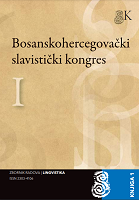Sufiksalne imeničke izvedenice u Voltićevu Ričoslovniku (tvorba sufiksima -/a/c, -l/a/c, -telj i -v/a/c)
Suffixational Nominal Derivatives in Voltić’s Ričoslovnik (by suffixes -(a)c, -l(a)c, -telj i -v(a)c)
Author(s): Marijana HorvatSubject(s): Morphology, Syntax, Lexis, Historical Linguistics, South Slavic Languages, Stylistics
Published by: Slavistički komitet BiH
Keywords: Josip Voltić; Ričoslovnik (vocabolario – wörterbuch) iliričkoga; italijanskoga i nimačkoga jezika; word-formation; suffixes -(a)c; -l(a)c; -telj; -v(a)c;
Summary/Abstract: The paper deals with the nominal derivatives formed by suffixation (suffixes -(a)c, -l(a) c, -telj, -v(a)c) in Voltić’s Ričoslovnik iliričkoga, italijanskoga i nimačkoga jezika (Vienna, 1803). Suffixation is the most productive way of word formation in nouns. This has also been confirmed by Voltić’s corpus. The majority of these derivatives are old and expected and Voltić has taken them over from the language as such, but they have also served him as a model for the formation of new words. These new derivatives will be analyzed in this paper. Special attention will be paid to the analysis of unusual derivatives, i.e. to cases in which we find some typical suffixes in special realizations, i.e. those formational models which are unusual because of the meaning of the derivative. Attention will also be drawn to derivatives formed by adaptation of the foreign model, primarily Italian and German. The analyzed examples will be determined according to their confirmation mostly in comparison with Rječnik hrvatskoga ili srpskoga jezika JAZU.
Journal: Bosanskohercegovački slavistički kongres
- Issue Year: I/2012
- Issue No: 1
- Page Range: 371-379
- Page Count: 9
- Language: Croatian

